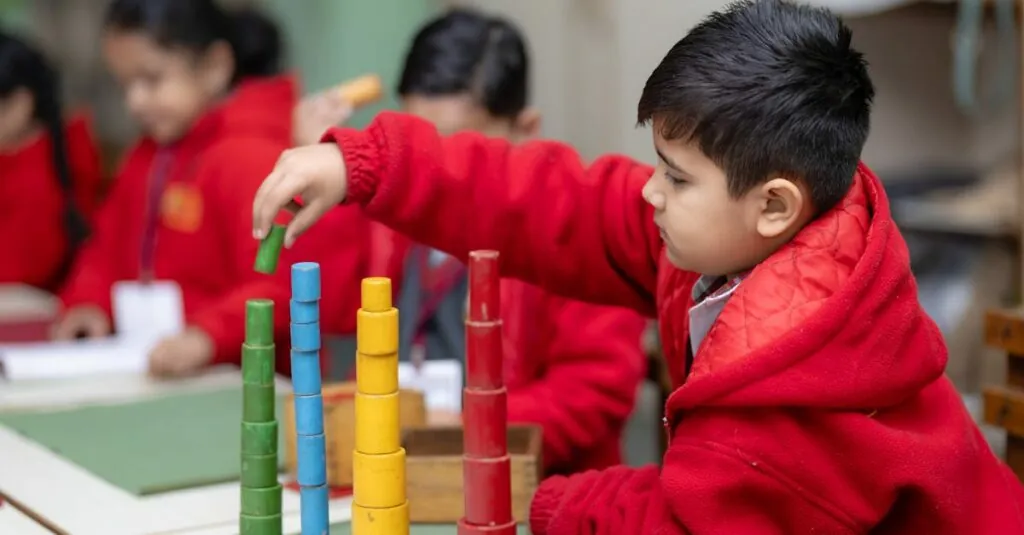Table of Contents
ToggleIn a world where kids seem to grow up faster than a speeding bullet, understanding child development has never been more crucial. A Bachelor’s degree in this field is like a superhero cape for aspiring educators and caregivers, equipping them with the tools to nurture and guide young minds. Imagine being the one who helps shape the future—no pressure, right?
This degree dives into the fascinating world of childhood growth, behavior, and learning. It’s not just about crayons and nap time; it’s about unlocking the mysteries of how children think, play, and thrive. Whether one’s goal is to work in schools, childcare, or even policy-making, a solid foundation in child development opens doors to a fulfilling career. So, why not take the plunge and become the expert every child deserves?
Overview of Child Development Bachelor Degree
Child development degree programs focus on the intricate processes of childhood growth and education. These programs typically require about 120 credit hours, involving courses in psychology, sociology, and education. Students delve into subjects such as developmental psychology, behavior management, and childhood education theories, which are critical for understanding how children learn and grow.
Internships play a significant role in these degree programs. Real-world experience allows students to apply their knowledge in settings such as schools, preschools, and community organizations. Faculty often emphasize hands-on learning, which enhances theoretical understanding through practical application.
Graduates from child development programs pursue diverse careers. Common roles include child care center director, early childhood educator, and family support specialist. Some graduates may choose to continue their education, seeking master’s degrees in specialized areas such as child psychology or family therapy.
Additionally, job prospects in this field remain strong. The U.S. Bureau of Labor Statistics projects a 7% growth rate in employment for preschool teachers from 2021 to 2031. Increased awareness about the importance of early childhood education fuels demand for qualified professionals in schools and community programs.
Specialization options also enhance career prospects. Programs often offer concentrations in areas like special education or infant development, allowing graduates to meet specific needs within their communities. Those pursuing this degree gain essential tools for fostering positive child outcomes, supporting cognitive, emotional, and social development throughout the critical early years of life.
Core Curriculum
Core curriculum courses in a child development bachelor’s degree focus on essential topics vital for understanding childhood growth and learning. These courses provide a strong foundation, enabling graduates to impact children’s lives positively.
Key Subjects Covered
Students explore several key subjects within the program. Developmental psychology gives insights into how children think and behave at various stages. Behavior management covers techniques to guide children’s actions effectively. Childhood education theories examine different approaches to teaching that meet individual needs. Early intervention strategies equip students with tools to assist children with developmental delays. Courses in family dynamics elucidate the role of family in a child’s development.
Skills Developed
Various skills are developed throughout the degree program. Communication skills become essential for conveying ideas effectively to children and parents. Observational skills enhance students’ ability to assess children’s needs and behaviors accurately. Problem-solving skills empower educators to address challenges in learning environments. Adaptability is fostered through experiences managing diverse classroom situations. Lastly, analytical skills enable students to evaluate theories and practices critically, shaping their approach to child development.
Career Opportunities
A Bachelor’s degree in child development opens a range of rewarding career paths. Graduates can leverage their skills to make a significant impact in various roles related to children’s growth and education.
Potential Job Roles
Numerous job roles await graduates of a child development bachelor’s degree. Early childhood educators play a vital role in teaching and nurturing young learners. Child care center directors provide leadership and manage programs that benefit children and their families. Child life specialists support children facing medical challenges, helping them cope and thrive. Family support specialists offer resources and guidance to parents. Those interested in advocacy may find positions in policy-making organizations, influencing child development practices for future generations.
Salary Expectations
Salary expectations for child development professionals vary by role and location. Early childhood educators earn an average salary of $38,000 annually, with possible variations based on experience and setting. Child care center directors can expect around $53,000 per year, while child life specialists average $70,000 annually. Family support specialists typically earn $45,000 yearly. Salary prospects often improve with advanced degrees or specializations, as the need for qualified professionals continues to grow.
Advantages of Pursuing a Bachelor Degree
Pursuing a Bachelor’s degree in child development offers numerous advantages for those passionate about working with children. Graduates acquire specialized knowledge in developmental psychology and education theories that enhances their understanding of how children grow and learn. Students engage directly with critical subjects like behavior management and early intervention strategies, fostering skills essential for effective educational practices.
Real-world experience gained through internships significantly boosts employability. Students often complete internships in schools and community organizations, which reinforce theoretical knowledge with practical application. This hands-on experience is invaluable for developing communication, observational, and problem-solving skills.
Career opportunities expand considerably for degree holders. Roles include early childhood educators, child care center directors, and child life specialists, each with numerous responsibilities aimed at improving child outcomes. Graduates can contribute meaningfully in family support roles too, influencing child development practices through policy-making.
Salary expectations also present an attractive aspect of this degree. Early childhood educators earn an average of $38,000 annually, while child care center directors can make around $53,000. Those in specialized roles, such as child life specialists, often see salaries nearing $70,000. It’s important to note that advanced degrees or specializations can further enhance earning potential.
Lastly, pursuing this Bachelor’s degree equips graduates with tools to advocate for children’s needs. Knowledge of family dynamics and educational policies supports informed decision-making in various settings. Overall, the degree cultivates both professional growth and a commitment to nurturing future generations.
Challenges and Considerations
Pursuing a Bachelor’s degree in child development presents several challenges that potential students should consider. The rigorous curriculum often demands strong time management skills due to the requirement of approximately 120 credit hours. Students frequently juggle coursework, internships, and personal responsibilities, which can lead to stress.
Understanding the emotional aspects of working with children can also be challenging. Graduates face the need to navigate complex family dynamics and address the emotional needs of children from varied backgrounds. This emotional intelligence proves critical in developing effective strategies for support.
Additionally, the competitive job market poses another consideration. While strong job prospects exist, graduates must continuously enhance their skills and adapt to new educational trends. Specializations like infant development or special education can significantly improve employment opportunities, but pursuing advanced degrees may become necessary for certain roles.
Financial considerations impact many students as well. Tuition rates for child development programs vary widely, leading to potential student debt. Choosing affordable schools or exploring financial aid options becomes crucial for effective budgeting.
Furthermore, graduates should stay informed about evolving policy changes that affect child development practices. Advocacy and policy-making roles may require ongoing education and training, emphasizing the importance of lifelong learning in this field. Understanding local and national developments helps graduates actively shape practices for the betterment of children.
Networking opportunities during internships and engagement with professional organizations can amplify career growth. These connections foster relationships that lead to mentorship and potential job leads, underscoring the significance of building a robust professional network.
A Bachelor’s degree in child development opens doors to a fulfilling career dedicated to nurturing the next generation. Graduates are equipped with vital skills and knowledge that empower them to make meaningful contributions in various educational and caregiving roles. The combination of theoretical learning and practical experience prepares them to address the diverse needs of children effectively.
As they navigate the challenges of this rewarding field, these professionals play a crucial role in shaping policies and practices that promote positive child outcomes. With a growing demand for qualified experts, pursuing this degree not only enhances career prospects but also fosters a lifelong commitment to advocating for children’s well-being.





